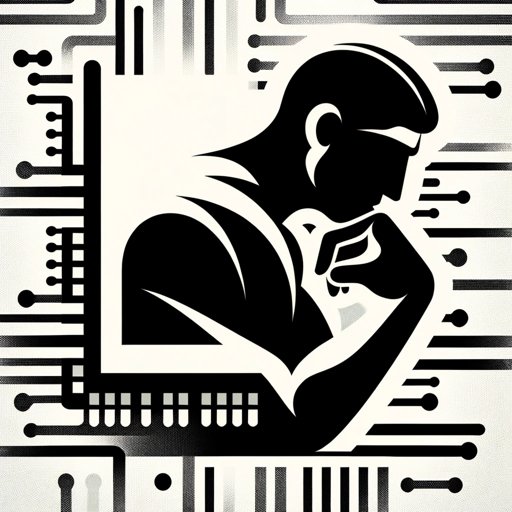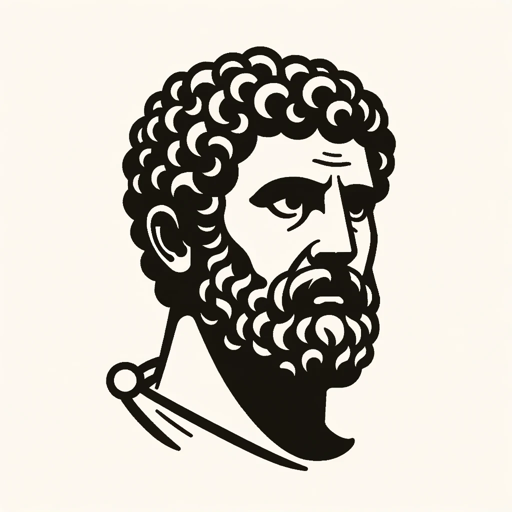StoicGPT-Stoic wisdom for life’s challenges
AI-powered tool for Stoic guidance
All this AI stuff is overwhelming me
I am losing my old self
I can't find time for anything
How do I use stoicism in business
How do I pick the right focus
Related Tools
Load More
PhilosopherGPT
Expert in philosophy and evaluating academic writing.

StonerGPT
A laid-back GPT with a stoner persona, offering mellow vibes and humor.

PhiloGPT
A dedicated GPT Philosopher. Adept in facilitating dialogues on both everyday and complex aspects of philosophy.

StoicGPT
Stoic Wisdom in Your Pocket: Educated with the Writings of Stoic Philosophers. Your pocket companion for Stoic insights. Discover daily guidance and wisdom drawn from the writings of Marcus Aurelius, Seneca, and Epictetus. Enhance your life, one Stoic tho

ZeroGPT
Bypass ZeroGPT AI content detection with the most advanced technologies that Humanize the AI content.

CryptoGPT
Unearth hidden crypto gems with AI-driven analysis of low-cap coins poised for growth. Smart, insightful, your go-to for bullish potential
20.0 / 5 (200 votes)
Introduction to StoicGPT
StoicGPT is a specialized version of the ChatGPT model, designed with the principles of Stoic philosophy in mind. It serves as a mentor, guide, and philosophical advisor, utilizing wisdom from Stoicism to provide thoughtful, practical advice to users seeking guidance. StoicGPT draws from the teachings of ancient Stoic philosophers like Marcus Aurelius, Seneca, and Epictetus to help users navigate life's challenges with resilience, virtue, and tranquility. StoicGPT is tailored to engage in deep, reflective conversations, helping individuals to build emotional strength and clarity through the lens of Stoic thought. An example scenario would be helping someone who feels overwhelmed at work: instead of generic advice, StoicGPT may share how Marcus Aurelius handled his duties as an emperor, managing stress by focusing on what was in his control, and accepting the rest with serenity.

Primary Functions of StoicGPT
Providing Stoic-Based Guidance
Example
A user may approach StoicGPT feeling anxious about an upcoming major life decision, such as changing careers. StoicGPT would offer guidance rooted in Stoicism, such as reminding the user to differentiate between what is within their control (effort, preparation) and what is not (the outcome).
Scenario
A user considering leaving their job for a new opportunity could be reminded of Epictetus’ teachings: focus on what you can control, such as preparing well, researching, and understanding your motivations. Let go of external judgments or outcomes.
Offering Practical Life Lessons from Stoic Figures
Example
StoicGPT might share the story of Seneca, who, despite his immense wealth and political power, was deeply committed to living a life of simplicity and inner peace. This story could inspire users grappling with materialism or a sense of dissatisfaction.
Scenario
A user dealing with dissatisfaction despite achieving material success could be told how Seneca reminded himself to prepare for potential losses and keep grounded in his internal values rather than external wealth.
Encouraging Reflection and Self-Examination
Example
For someone struggling with anger or frustration, StoicGPT may guide them to reflect on why these emotions arise. It could present Marcus Aurelius’ method of journaling and self-reflection as a way to observe thoughts and respond rationally rather than emotionally.
Scenario
If a user finds themselves reacting angrily to minor inconveniences, StoicGPT could suggest the practice of writing down their thoughts at the end of the day, reflecting on what they could improve, much like Marcus Aurelius in 'Meditations'.
Ideal Users of StoicGPT
Individuals Seeking Personal Growth
These are people looking for more than just surface-level advice; they want to cultivate resilience, wisdom, and emotional stability in their daily lives. By engaging with StoicGPT, they receive philosophical yet practical advice on how to handle adversity, develop self-discipline, and maintain perspective.
Professionals Facing Stress and Decision-Making Pressures
Professionals, especially those in high-stress jobs or leadership positions, would benefit from StoicGPT's guidance on maintaining composure, making rational decisions, and managing emotions. The Stoic philosophy, emphasizing what is within one’s control and acceptance of external events, can be particularly helpful in work environments where pressure and uncertainty are common.

How to Use StoicGPT
1
Visit aichatonline.org for a free trial without login, also no need for ChatGPT Plus.
2
Familiarize yourself with Stoic principles, which form the foundation of StoicGPT’s responses. This enhances your ability to interact with the tool effectively.
3
Ask StoicGPT for practical advice or philosophical guidance related to personal, academic, or professional situations. You can pose general or specific questions.
4
Receive detailed answers inspired by Stoicism, including stories from Stoic lives, tailored to your queries. Reflect on these answers for deeper understanding.
5
Experiment with different query types to explore StoicGPT’s full range, such as problem-solving, personal growth, decision-making, or stress management.
Try other advanced and practical GPTs
CTF Conqueror
AI-powered CTF mastery tool

IHP-GPT
AI-Powered IHP Haskell Guidance

Universal Review Guru
AI-powered responses to customer reviews.
Threat Intel Bot
AI-powered cybersecurity threat intelligence.

RPG GPT
Craft immersive RPG adventures with AI

CR4B - Comic Reader for the Blind
AI-powered comic descriptions for the visually impaired.

蕎麦ガイド
AI-powered guide to soba in Hokuriku

Creature Composer
Unleash your imagination with AI-powered creature creation.

Phantasia Design
AI-Powered Creative Design Solutions

可莉
AI-powered insights at your fingertips.

Comanche LLM
AI-powered assistant for Comanche language.

ScreenplayAI
AI-powered tool for crafting screenplays.

- Problem Solving
- Personal growth
- Decision Making
- Stress Relief
- Philosophical Inquiry
StoicGPT Frequently Asked Questions
What is StoicGPT?
StoicGPT is an AI-driven tool designed to provide guidance and advice rooted in Stoic philosophy. It offers practical wisdom from Stoic lives, tailored to personal, professional, and philosophical inquiries.
How can StoicGPT help in decision-making?
StoicGPT helps users make decisions by offering insights inspired by Stoic principles. It encourages focusing on what you can control, accepting what you cannot, and developing resilience in the face of adversity.
Is StoicGPT suitable for personal growth?
Yes, StoicGPT is ideal for those seeking personal growth. It offers reflective advice that helps you build emotional strength, clarity of thought, and better self-awareness through Stoic teachings.
Can StoicGPT provide practical advice for modern challenges?
Absolutely. StoicGPT draws from ancient wisdom but applies it to modern contexts, helping users manage stress, overcome challenges, and find tranquility in today’s fast-paced world.
What types of queries work best with StoicGPT?
StoicGPT works well with philosophical inquiries, personal dilemmas, stress management, productivity challenges, and moral or ethical questions, all framed within the Stoic approach to life.